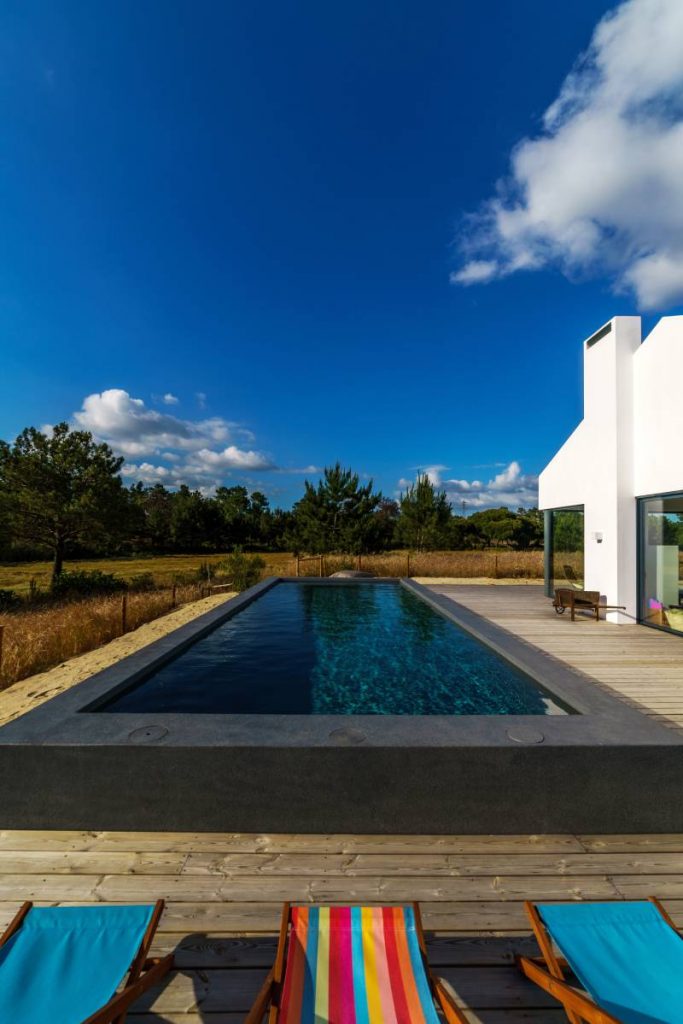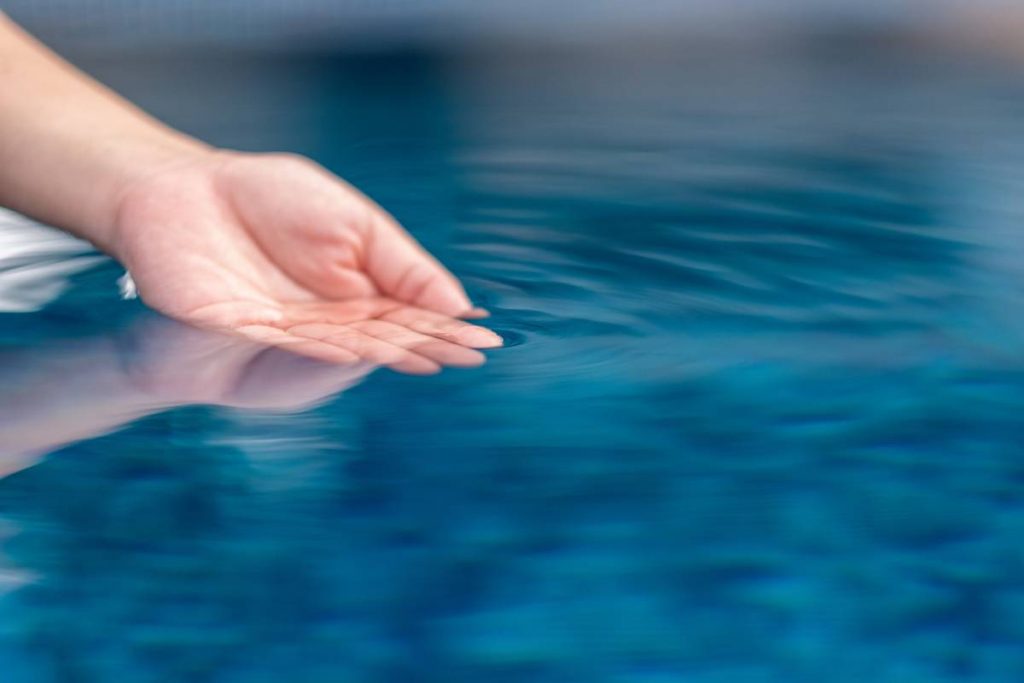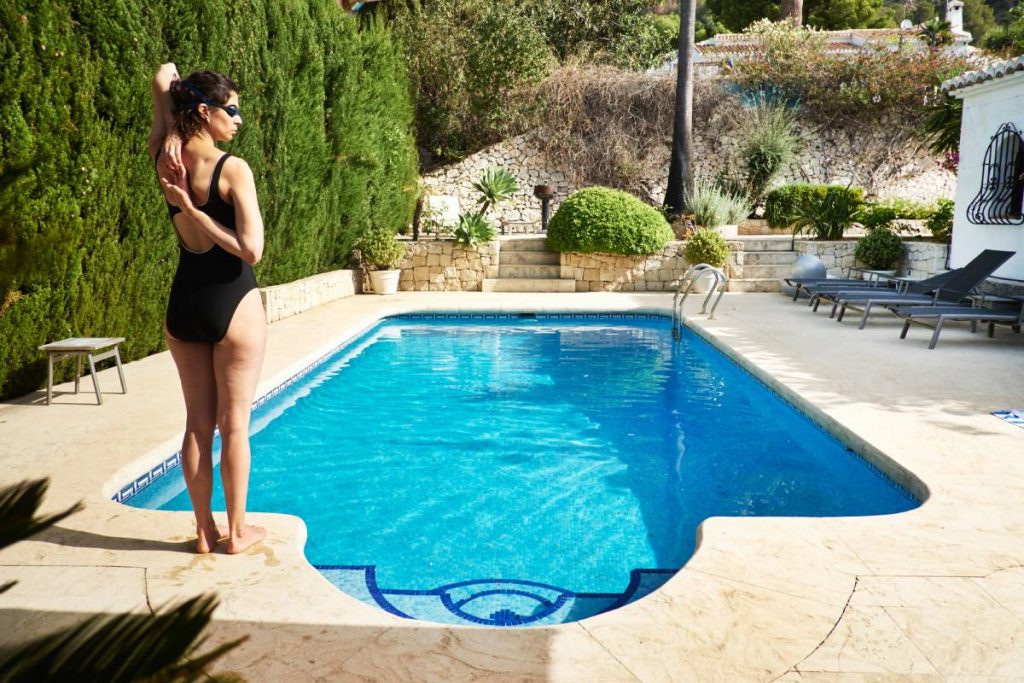Adding a swimming pool to your home can be a fantastic way to enjoy the summer months. Not only does it provide a refreshing escape from the heat, but it also boosts your property’s value and creates opportunities for family fun.
Yet, the decision-making process doesn’t stop at choosing the type of pool for your backyard. You also need to consider the type of water to fill it. Your choice should reflect your pool usage and other factors to ensure clean and clear water.
While many pools opt for chlorinated water initially, it’s worth exploring alternative options like saltwater or mineral pools. Despite its popularity, chlorinated water isn’t the only choice available. When planning your pool installation, it’s essential to weigh all your options carefully. The most common choice might not necessarily be the best fit for your needs.
How many types of swimming pools are there?
There are several types of swimming pools, each with its own characteristics and purposes. Some common types include:

- In-ground pools: These are pools that are built into the ground and are often made of materials like concrete, fibreglass, or vinyl. They can be customized in various shapes and sizes.
- Above-ground pools: These pools are installed above the ground and are typically made of materials like metal, resin, or wood. They are often more affordable and easier to install than in-ground pools.
- Indoor pools: These pools are located inside a building and are typically used year-round. They require proper ventilation and climate control systems to prevent moisture buildup and maintain comfortable swimming conditions.
- Outdoor pools: These pools are located outside and are exposed to the elements. They are popular in areas with warm climates and are often built with features like decks, landscaping, and fencing.
- Natural pools: Also known as swimming ponds or eco-pools, these pools use plants and natural filtration systems to maintain water quality instead of chemicals. They blend into the landscape and provide a more natural swimming experience.
- Saltwater pools: These pools use a saltwater chlorination system to sanitize the water instead of traditional chlorine. They are often preferred for their softer feel and lower chemical smell.
- Plunge pools: These small, deep pools are primarily used for cold water therapy or relaxation. They are typically shallower than traditional pools but deeper than hot tubs.
- Residential Swimming Pools: These are typically found in private homes and can range from small, basic designs to elaborate features with various amenities.
- Commercial Swimming Pools: These pools are usually larger and are found in hotels, resorts, fitness centres, and other public facilities. They may include features like water slides, diving boards, or lap lanes.
- Infinity Edge Pools: Also known as vanishing edge or negative edge pools, these pools create the illusion of water extending to the horizon by having one or more edges that seem to merge with the surrounding landscape.
- Olympic-size Pools: These pools are built to the dimensions and specifications required for Olympic swimming competitions, typically measuring 50 meters in length.
- Therapeutic Pools: Also known as therapy pools or hydrotherapy pools, these are designed for rehabilitation and therapeutic purposes, often featuring features like adjustable water temperature and resistance jets.
- Hot Tubs and Spas: While not strictly swimming pools, hot tubs and spas are small, heated pools typically designed for relaxation and hydrotherapy.
These are just a few examples, and there are many other variations and speciality pools available, each with its own unique features and purposes.
What types of water can go in a swimming pool?
Today, there are 3 types of pool water that are popular among the pool-lovers, which are chlorine pool water, saltwater swimming pool and mineral pool water. Let’s see how each of them can suit what you’re looking for.
What is chlorine pool water?
Chlorine pool water is the most common type found in both private and public pools. It’s effective because chlorine reacts with various contaminants like dirt, sweat, lotion, and yes, even urine (not pleasant!). This reaction helps clean and sanitize the pool water.
In chlorine pool water, chlorine breaks down into hypochlorite ions and hypochlorous acid, both of which kill bacteria.
What makes swimming in chlorine pools different?
Chlorine is typically used in three forms: tablets, granules, and liquid, all of which can be directly added to keep the pool water sanitized. Plus, chlorine can be stored for a long time without losing its effectiveness.
But, if you’re prone to skin allergies, irritation, or asthma, it’s best to avoid chlorine pool water and explore other options instead.

What is a saltwater swimming pool?
Considered a superior alternative to chlorine pools, saltwater swimming pools gained popularity in the 1980s and have remained a preferred choice since. Despite common belief, saltwater pools do contain chlorine, albeit in lower concentrations.
Unlike ocean water, saltwater pool water doesn’t taste the same and doesn’t have a high salt content. Instead, a small amount of salt is used to replace much of the chlorine in the purification process. Saltwater pools typically maintain chlorine levels at around ¼ of those found in traditional chlorine pools.
In saltwater systems, special pool salt is added instead of chlorine directly. This salt interacts with the water’s salt cells to generate chlorine, resulting in cleaner pool water with fewer added chemicals.
What makes swimming in saltwater pools different?
Due to the lower chlorine content, saltwater pools offer several advantages over-chlorinated pools. They significantly reduce the risk of skin and eye irritation commonly associated with high-chlorine environments.
Additionally, the water in saltwater pools feels softer, providing a more pleasant swimming experience. Saltwater is gentler on the skin and offers better hydration compared to chlorinated water.
In terms of pool maintenance, saltwater pools require less frequent additions of salt compared to chlorine chemicals. Over time, this, combined with the relatively low cost of pool salt, makes saltwater pools more cost-effective than their chlorine counterparts.
What is a mineral water pool?
Mineral water pools are often seen as a healthier option compared to traditional chlorine and saltwater pools.
As the name implies, mineral water pools incorporate extra minerals to maintain cleanliness and prevent the growth of bacteria and algae. Common minerals used in these pools include magnesium chloride, sodium chloride, and potassium chloride. By using mineral additives, these pools can reduce chlorine usage by approximately 50%, and certain systems like E-Z Pool may even eliminate the need for chlorine entirely.
What makes swimming in mineral pools different?
Similar to saltwater pools, the water quality in mineral pools tends to be superior to that of purely chlorinated pools. Mineral-treated water often feels softer, thanks to the interactions between the minerals, providing a more comfortable swimming experience. Like saltwater, mineral pools can also help minimize skin and eye irritation associated with chlorine exposure.
One notable advantage of mineral pools over saltwater pools is their gentleness on pool equipment and accessories. Unlike saltwater, which can gradually corrode metals and other materials, mineral-treated water is more gentle, extending the lifespan of pool components.
Furthermore, mineral pools offer potential health benefits beyond just water quality. The additional minerals may help alleviate certain body aches and pains without triggering allergies or irritations commonly associated with chlorine.

How much does it cost to install an inground pool in my house?
Installing an inground pool typically costs around $55,000, making it a sound investment for boosting your home’s value and offering more customization options compared to above-ground pools. Let’s break down the three common materials used for inground pools:
Concrete
Concrete pools are among the priciest options, averaging around $50,000. They offer extreme durability and can be tailored to almost any shape or size. They’re also compatible with various special features and designs. However, they require resurfacing every 10 to 15 years, have a rough surface that may be uncomfortable for sensitive feet, and are prone to algae growth due to their porous nature, necessitating more chemical use and intensive maintenance.
Fibreglass
Fibreglass pools have a smoother surface than concrete, reducing algae growth and chemical requirements over time. They typically cost around $40,000 but offer fewer customization options, as they’re usually prefabricated and delivered in one piece. Fiberglass pools are limited in size, with a maximum extension of 16 feet and a depth of six feet.
Vinyl liner
Vinyl liner pools are the most budget-friendly option, averaging $30,000. They offer versatility in design and size, constructed using panels fitted into a concrete foundation. Their material resists algae growth, potentially saving on chemical and filter expenses. However, the liner needs replacement every seven to 15 years, increasing long-term costs and maintenance efforts, and is prone to tears.





